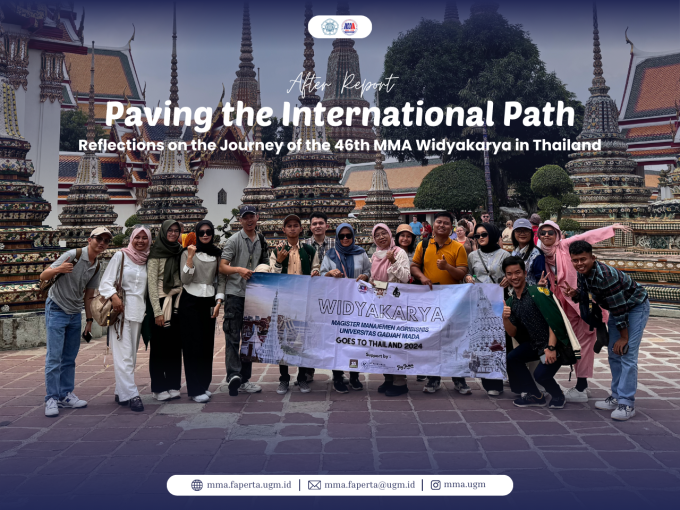
The Master of Agribusiness Management (MMA) conducted an interesting field trip (Widyakarya) abroad, specifically in Thailand between February 26 and 28, 2024. MMA students had the opportunity to visit a number of prestigious corporate institutions, including Big Bee Garden, Yara International, and the Bank for Agriculture and Agricultural Cooperatives (BAAC). However, this trip was not just limited to industrial visits. The students were also given the opportunity to interact directly with Thailand’s academic environment by visiting one of the country’s top universities, Kasetsart University. In this short period of time, students had an in-depth experience to understand the dynamics of agribusiness in Thailand and broaden their horizons internationally.
Widyakarya is not just an ordinary activity for MMA UGM students. Widyakarya is part of the MMA curriculum itself. As one of the compulsory courses. Widyakarya offers an exciting experience of visiting various institutions, both at home and abroad. Widyakarya is not just an outing, but a golden opportunity for MMA UGM students to gain new knowledge and broaden their horizons on the application of agribusiness management globally. On a mission to pursue deeper knowledge and dive into the reality of the industry, students utilize Widyakarya as an opportunity to learn from the best practitioners and experience first-hand the dynamics that exist in the field.
Monday, February 26, 2024: An enthusiastic first day began with a visit to Big Bee Garden, one of Thailand’s leading honey producers. “Big Bee Garden is our first destination on the Widyakarya trip in Thailand,” said one of the students excitedly. This place is not just a tourist attraction, but also an education center about beekeeping and the process of making pure honey. With a 100% pure guarantee without sugar, products such as honey, bee pollen, royal jelly, and propolis. The products from Big Bee Garden are not only mouth-watering, but also inspire an understanding of health. This visit is expected to open new insights for students, preparing them as competent entrepreneurs in the agribusiness industry.
Tuesday, February 27, 2024: The next step took students to Yara International, a leading fertilizer company in Thailand. This visit was not just about seeing the production process, but also a rare opportunity to dive into the business behind it. “During this visit, we got an amazing opportunity to see firsthand Yara’s cooperation with distributors, farmers, and fertilizer packaging plants,” said a student. Through this visit, students are expected to be able to understand more about the business of fertilizer companies, from production to product marketing.
Wednesday, February 28, 2024: On the last day, students deepened their understanding with visits to two prominent places. First, Kasetsart University was their destination, where students were introduced to the lecture system and campus environment. “Through this visit, we were able to experience the academic atmosphere of Thailand and compare it with our experience at UGM,” said a student. The visit ended with a visit to the Bank for Agriculture and Agricultural Cooperatives (BAAC), a large bank that supports agricultural growth in Thailand. “BAAC plays an important role in providing financial assistance and mentoring to farmers,” added another student. As such, the visit brought new insights into the role of financial institutions in supporting the growth of the agricultural sector.
From an enthusiastic trip to Big Bee Garden to diving into business at Yara International, and experiencing the academic atmosphere at Kasetsart University, as well as deepening the understanding of the important role of financial institutions at BAAC, UGM Master of Agribusiness Management (MMA) students have ended their Widyakarya trip with various invaluable experiences. The visit not only gave them new insights into the dynamics of the agribusiness industry in Thailand, but also broadened their views on the application of agribusiness management globally. Thus, Widyakarya has not only become part of their curriculum, but also a foundation for their next steps in building a career in the increasingly complex and diverse world of agribusiness.
